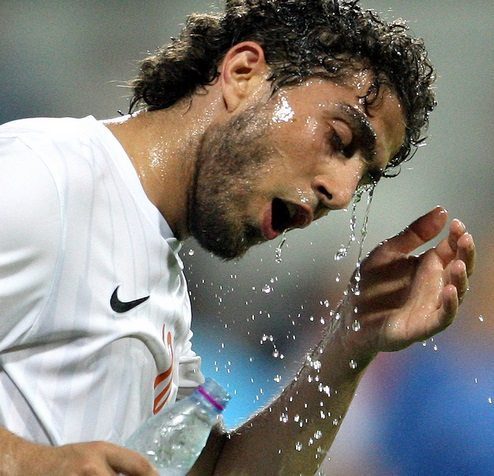[dropcap style=”font-size:100px; color:#992211;”]H[/dropcap]i Sepp, yeah, it’s me again. Yeah, apparently we should be more responsible in our advertising and sponsorship partners. It’d mean less cash for us though.
Sepp? Sepp? You still there?
I’ll call back.
Sporting events should ditch nutritional supplements and sports drinks sponsorship.
Such sponsorship could mislead the public into thinking these products work well and/or are good for health—for which there is no strong scientific evidence—suggest Simon Outram and Bob Stewart of the Institute of Sport, Exercise, and Active Living, in Melbourne, Australia. Outram and Stewart accept that nutritional supplements and rehydration drinks don’t compare with the unhealthiness of fast food, tobacco, or alcohol, all of which have been associated with major sporting events.
But the very fact that these products are marketed as beneficial or essential for sporting prowess and/or general health, when the evidence has so far failed to substantiate these claims or justify their cost, is likely to make it harder for the public to judge the value of these products objectively, they suggest.
“Successful sponsorship campaigns remove or minimise any scepticism about the product (a common reaction to advertising),” they write. “A form of seamless or hidden product association is created whereby such products come to be seen as integral to sport—the sports supplement or sports drink,” they say, adding that celebrity endorsement helps to promote that idea.
“It is for good reason that nutritional supplement and sports drinks companies invest heavily in sports sponsorship,” they write. “Such sponsorship—together with associated product endorsements and advertising—conveys the message that their products are integral to sporting engagement and achievement.”
But they warn: “Sport may have found itself lending unwarranted credibility to products which would otherwise not necessarily be seen as beneficial for participation in sports and exercise or as inherently healthy products.”
The issue has already prompted some degree of disquiet among sporting authorities about the perception that they might be seen to be endorsing nutritional supplements and sports drinks, suggest the authors.
The Australian Institute of Sports has voiced concerns about this, while the American Dietetic Association, Dieticians of Canada, and the American College of Sports Medicine have issued a joint statement, which among other things, questions the manufacturers’ claims for the effectiveness of these products. The World Anti-Doping Agency has highlighted the potential inclusion of undeclared and banned substances in these products as a result of global differences in labelling and manufacture.
Source: BMJ-British Medical Journal
Photo: Doha Stadium Plus

Some of the news that we find inspiring, diverting, wrong or so very right.



















